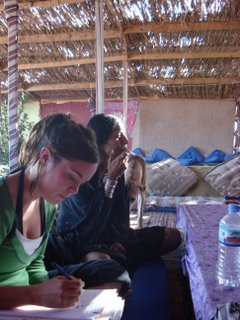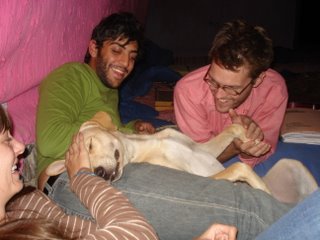The former Chilean dictator Augusto Pinochet died on December 10. Here's an interesting obituary from National Public Radio, USA.
Greg Palast writes here on Pinochet and Milton Friedman, who also died recently.
No online reference to Pinochet can be complete without the obituary from the D.C.-based National Security Archive. There are some interesting tidbits here about US responsibility for Chile's "regime change." Rome wasn't burned in a day, you know. It took classified assessments and memos first, and fastidious denials later.
12.10.2006
Fall Break in Cyprus

My friend Kavita's yawn became the stuff of postcard photography during this sunset in Agia Napa.

The ancient ruins of Apollo's Temple near Limassol. Cyprus also figures prominently in Greek mythology for being the place that Aphrodite emerged from the Sea.
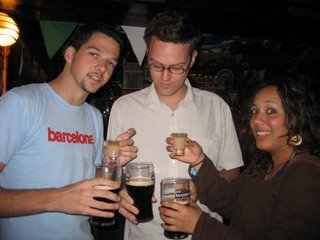
Irish Car Bombing activity was reported at our table. Grimacing, I later decomissioned my glass.
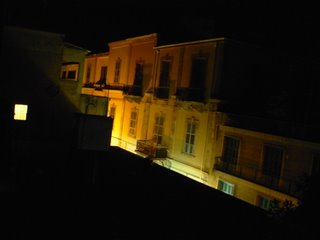
A typical street in the old section of Nicosia at night.

The colors of streets were really wonderful in Cyprus. I liked the blue shutters I kept seeing, in this case in Larnaka.
Cyprus, the two governments and the EU
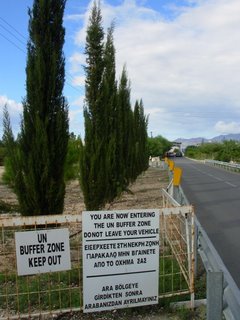

Here are a couple of photos of the UN Green Line between the "Turkish Republic of Northern Cyprus" and the Greek-oriented "Republic of Cyprus." Crossing today is quite easy and they will stamp you in and out on a separate sheet of paper to ease your travel in other places. We visited a tiny little Turkish town near Nicosia, not knowing really what we were going to see there. After about half an hour of curiosity seeking among government housing developments, and modest commercial buildings and a coffee shop, we shrugged and returned to the more tourist-oriented Greek side. When we returned to our rental car, we realized we had parked near cement machine-gun fortifications, grown over with plants. They call it Cyprus coffee in the south, but you can imagine that they definitely call the muddy, thick espresso Turkish in the north.
This website for the capital Nicosia not surprisingly pushes political buttons by pronouncing Nicosia "The Last Divided City in Europe." Other signs of competing political claims are preseneted to tourists like myself, from newspapers, billboards, brochures, roadsigns and even maps themselves, pointing out the areas that are "under foreign occupation." A juice bar owner in Agia Napa, in the south, said that there was "nothing" to see in the north. He said, "I don't know about you, but when someone comes to my country, I only want to tell them to see what there is to be proud about. Save your time and stay in the Free State." A Greek Cypriot friend of mine had a sister advised me not to spend any money in the north that would undercut "the boycott." On the other hand, a Turkish-American friend has told me that the Turkish Cypriots are the victims of colonialism in this standoff and the EU is just using the Cyprus issue to marginalize Turkey.
Having spent almost all of our time on one half of an island, even though we did not get much of the Greek narrative down, we heard almost nothing of the Turkish one. And as I began to see in the past while living in Northern Ireland, I have to imagine there is a spectrum between the hard line opinions with a more complicated and interesting history that could be the basis for a shared future in a unified power-sharing arrangement. Easy for me to say, I know. Regardless of our interest in human rights and politics, Christian, Hania, Kavita and I were just basically hanging out on the beach, driving around, occasionally taking pictures of pretty things.
12.09.2006
12.08.2006
Abdullahi An-Na'im on Shari'a Law
This week, Abdullahi An-Na'im came to AUC to deliver a few lectures. He points out some interesting possibilities in the political sphere for forwarding emancipatory religious and human rights agendas in the Muslim World. Far from being an advocate of a Bush/Rice vision for the Middle East (which could go unstated if only they'd stop invoking human rights), he criticizes both the imposed colonial discourse and the post-colonial Islamist discourse on these matters. Since I don't feel competent to sum up his work, I'll put a few links up.
Take a look at An-Na'im's project, The Future of Shari'a Law, and his own website at Emory University in Atlanta, USA, which features several downloads of his work.
An-Na'im left Sudan after his mentor, the Islamic reformer Mahmoud Mohamed Taha, was executed by the Sudanese government in 1985. You can read about the Republican Brothers and their interest in Shari'a reform, among other projects, in several places, including:
New Perspectives Quarterly
Alfikra - The Republican Thought
World Peoples' Blog
The Sudanese Thinker
Take a look at An-Na'im's project, The Future of Shari'a Law, and his own website at Emory University in Atlanta, USA, which features several downloads of his work.
An-Na'im left Sudan after his mentor, the Islamic reformer Mahmoud Mohamed Taha, was executed by the Sudanese government in 1985. You can read about the Republican Brothers and their interest in Shari'a reform, among other projects, in several places, including:
New Perspectives Quarterly
Alfikra - The Republican Thought
World Peoples' Blog
The Sudanese Thinker
The Field
I am coming up for air after some writing, some traveling and various projects. My decline in output is making the CR sponsors a little restless. So to calm them down, I decided to embark on some long-winded prose without hyper-links and explain how I am thinking of the relationship of human rights to the state.
I've been thinking about somehing along the lines of David Kennedy: what is not working in the "field" of human rights, whether "field" means practical limits to professionalism generally, or more abstractly, a zone of politics, critique, imagination, and emancipation. I like the concept of emancipation, no matter that the word seems haughty or fundamentally historic as in its American abolitionist movement sense. People like David Kennedy describe human rights as trying to occupy the political field and obscuring alternative approaches to emancipation, and I think this is a good thing to be concerned about.
Human rights discourse takes a hard look at particular state actions, but not state sovereignty and the continuing power of states to commit such abuses. On the contrary, human rights discourse depends on state institutions so that they will enter into the conventions, protocols and other contracts that set up justicability for human rights claims. This is a problem for several reasons, for example, most of the world's nation-states have their origins in a monopolization of legal uses of violence (and often speech, assembly and other personal freedoms) in the hands of an elite who barred what we now may consider human rights concepts, such as the right to life, self-determination, non-discrimination, and as described in the African Charter, the rights of peoples. While I accept that human rights law's origin in the state means that it has its origin in hegemony, I think human rights law presents some important opportunities for emancipation. New ideas about jurisprudence, admissibility, and of course, new legal norms themselves may be moving in the direction of wider support and capacity to reconfigure and localize formal aspects of the human rights movement. This is a good thing, in my view.
Yet in any close look at human rights, some chewy epistemological questions emerge. Who or what, other than the state, or the contracts agreed to by states in common, can stabilize rights, grant them, and maintain access to them? If we try to keep rights, but refuse their origins in the state, we assume that human dignity or some other human quality is the basis for an ethic of human treatment that has its origins prior to the state, leading us to particular ideas about religion or a supposedly self-evident humanist inkling akin to the Golden Rule. If indeed an origin for rights exists outside of the state, why do we find throughout world history so many variations in societal norms and roles? Do human rights step in when the state fails, or do states use the simple fact of their accession to human rights instruments to legitimize their abuses? States typically wager that enforcement of international law is weak and that challenges to state power from human rights instruments will only come in the form of negative limits, which can be gotten around with a little creativity or obfuscation. Resulting proposals to replace state citizenship with some new global citizenship replace the original questions about states and rights with new questions that may even be more problematic concerning soft regional power. What would global or regional citizenship even mean? I really cannot tell.
The idea in all of this for me is that somehow emancipation through legal means needs to be complemented by emancipation through political means, and likely proceeded by it. Maybe a critique of the state can be synonymous with legal reforms, and a legitimate juncture between the two will be easier to imagine in the future. For now, the sense of human rights as a new, contingent vision of power, challenging both the state and the political sphere even while it draws strength and attention from them, is interesting to me. I will still admit the following, and encourage others to do the same: that the attempts of human rights at emancipation seem outmatched and internally confused for the foreseeable future. But this does not need to dissuade us from working harder to reconcile different emancipatory strategies.
I've been thinking about somehing along the lines of David Kennedy: what is not working in the "field" of human rights, whether "field" means practical limits to professionalism generally, or more abstractly, a zone of politics, critique, imagination, and emancipation. I like the concept of emancipation, no matter that the word seems haughty or fundamentally historic as in its American abolitionist movement sense. People like David Kennedy describe human rights as trying to occupy the political field and obscuring alternative approaches to emancipation, and I think this is a good thing to be concerned about.
Human rights discourse takes a hard look at particular state actions, but not state sovereignty and the continuing power of states to commit such abuses. On the contrary, human rights discourse depends on state institutions so that they will enter into the conventions, protocols and other contracts that set up justicability for human rights claims. This is a problem for several reasons, for example, most of the world's nation-states have their origins in a monopolization of legal uses of violence (and often speech, assembly and other personal freedoms) in the hands of an elite who barred what we now may consider human rights concepts, such as the right to life, self-determination, non-discrimination, and as described in the African Charter, the rights of peoples. While I accept that human rights law's origin in the state means that it has its origin in hegemony, I think human rights law presents some important opportunities for emancipation. New ideas about jurisprudence, admissibility, and of course, new legal norms themselves may be moving in the direction of wider support and capacity to reconfigure and localize formal aspects of the human rights movement. This is a good thing, in my view.
Yet in any close look at human rights, some chewy epistemological questions emerge. Who or what, other than the state, or the contracts agreed to by states in common, can stabilize rights, grant them, and maintain access to them? If we try to keep rights, but refuse their origins in the state, we assume that human dignity or some other human quality is the basis for an ethic of human treatment that has its origins prior to the state, leading us to particular ideas about religion or a supposedly self-evident humanist inkling akin to the Golden Rule. If indeed an origin for rights exists outside of the state, why do we find throughout world history so many variations in societal norms and roles? Do human rights step in when the state fails, or do states use the simple fact of their accession to human rights instruments to legitimize their abuses? States typically wager that enforcement of international law is weak and that challenges to state power from human rights instruments will only come in the form of negative limits, which can be gotten around with a little creativity or obfuscation. Resulting proposals to replace state citizenship with some new global citizenship replace the original questions about states and rights with new questions that may even be more problematic concerning soft regional power. What would global or regional citizenship even mean? I really cannot tell.
The idea in all of this for me is that somehow emancipation through legal means needs to be complemented by emancipation through political means, and likely proceeded by it. Maybe a critique of the state can be synonymous with legal reforms, and a legitimate juncture between the two will be easier to imagine in the future. For now, the sense of human rights as a new, contingent vision of power, challenging both the state and the political sphere even while it draws strength and attention from them, is interesting to me. I will still admit the following, and encourage others to do the same: that the attempts of human rights at emancipation seem outmatched and internally confused for the foreseeable future. But this does not need to dissuade us from working harder to reconcile different emancipatory strategies.
11.15.2006
Victory Soup
For a few days last week, in a food poisoning haze, I spent much of my time walking dizzily back and forth between the bathroom and my bed.
After I stabilized and remounted the reading/taxi/smile horses, I found myself ready to eat a delicious soup, the invention of a good friend of mine here, Adolf. He and my roommate Joseph and I enjoyed a nice meal together this past weekend. The soup represents a dramatic moral victory for me: food without poisoning.
Victory Soup
Serves 3 Dudes
Chop up 1/4 kilo (each) of:
Okra (Bamieh)
Potato (Botatis)
Freshly-Shelled Peas (Fasoulia)
Carrot (Gazaht)
Boil lightly in enough water to cover it up for 30-40 minutes until it all seems tender. Don't worry about the broth, it will be thin, no problem. The key, though: a few dashes of cumin, pepper and salt to taste with a very Egyptian squirt of lemon.
Complement Victory Soup with kofta/tomato/onion/tahini sandwiches in pita-type bread.
After I stabilized and remounted the reading/taxi/smile horses, I found myself ready to eat a delicious soup, the invention of a good friend of mine here, Adolf. He and my roommate Joseph and I enjoyed a nice meal together this past weekend. The soup represents a dramatic moral victory for me: food without poisoning.
Victory Soup
Serves 3 Dudes
Chop up 1/4 kilo (each) of:
Okra (Bamieh)
Potato (Botatis)
Freshly-Shelled Peas (Fasoulia)
Carrot (Gazaht)
Boil lightly in enough water to cover it up for 30-40 minutes until it all seems tender. Don't worry about the broth, it will be thin, no problem. The key, though: a few dashes of cumin, pepper and salt to taste with a very Egyptian squirt of lemon.
Complement Victory Soup with kofta/tomato/onion/tahini sandwiches in pita-type bread.
11.07.2006
An Iftar in Imbaba
This posting comes about three weeks late. But travel with me through these somewhat blurry photos to that time known as the final week of Ramadan, that place known as Imbaba, Cairo, where you would have found me with a couple of foreign friends enjoying a wonderful evening of food, fireworks and banter with Egyptian pals in their neighborhood, not so far from where I live.
 The iftar served on the sidewalk outside of this restaurant was in such hot demand that everyone stood shoulder to shoulder using forks to eat out of big dishes. Semolina pastas, koushary, nutty pastries, and casseroles of beef, lamb and chicken were de rigeur. To drink: tamarind juice, kharkady and various root-derived beverages. Mumtaz!
The iftar served on the sidewalk outside of this restaurant was in such hot demand that everyone stood shoulder to shoulder using forks to eat out of big dishes. Semolina pastas, koushary, nutty pastries, and casseroles of beef, lamb and chicken were de rigeur. To drink: tamarind juice, kharkady and various root-derived beverages. Mumtaz!
 Adjacent to the restaurant was this assemblage of birdcages, containing canaries, parakeets, pigeons and doves. The proprietor is a local legend and also an antiques collector. I did not feel comfortable taking his picture but I had no problem taking pictures of his birds.
Adjacent to the restaurant was this assemblage of birdcages, containing canaries, parakeets, pigeons and doves. The proprietor is a local legend and also an antiques collector. I did not feel comfortable taking his picture but I had no problem taking pictures of his birds.
 Ramadan streamers can be so lovely as to be worthy of their own holiday.
Ramadan streamers can be so lovely as to be worthy of their own holiday.
 The iftar served on the sidewalk outside of this restaurant was in such hot demand that everyone stood shoulder to shoulder using forks to eat out of big dishes. Semolina pastas, koushary, nutty pastries, and casseroles of beef, lamb and chicken were de rigeur. To drink: tamarind juice, kharkady and various root-derived beverages. Mumtaz!
The iftar served on the sidewalk outside of this restaurant was in such hot demand that everyone stood shoulder to shoulder using forks to eat out of big dishes. Semolina pastas, koushary, nutty pastries, and casseroles of beef, lamb and chicken were de rigeur. To drink: tamarind juice, kharkady and various root-derived beverages. Mumtaz! Adjacent to the restaurant was this assemblage of birdcages, containing canaries, parakeets, pigeons and doves. The proprietor is a local legend and also an antiques collector. I did not feel comfortable taking his picture but I had no problem taking pictures of his birds.
Adjacent to the restaurant was this assemblage of birdcages, containing canaries, parakeets, pigeons and doves. The proprietor is a local legend and also an antiques collector. I did not feel comfortable taking his picture but I had no problem taking pictures of his birds. Ramadan streamers can be so lovely as to be worthy of their own holiday.
Ramadan streamers can be so lovely as to be worthy of their own holiday.
10.30.2006
House Arrest for Pinochet (again)
It was formally announed today that the former president of Chile, General Augusto Pinochet, is once again under house arrest. There is much to say about the strange story of Pinochet, his assets, how he came to power, and the violence his regime sponsored in Chile and in other countries (including the US) in the 1970s and 80s. Here are some links in case you want to read further.
The Guardian's report of the house arrest.
Several articles about Pinochet's increasing culpability in The Jurist at the University of Pittsburgh, USA.
If you want to get studious, read a detailed account of Pinochet's rule, and see the declassified documents that tie the Nixon administration directly to Pinochet's installment in place of the democratically-elected President Allende, check out Peter Kornbluh's The Pinochet File. The introduction to the book is downloadable and you can even go to see the documents yourself next time you are in DC. Little of this is really contested, its just that no one is pursuing it.
Christopher Hitchens explores the US connection to Chile and other nations in that period in the angry and sparkling book, The Trial of Henry Kissinger.
If you and a friend or date are looking for a sobering documentary, check out The Trials of Henry Kissinger, based partly on the book of the similar name.
The legal actions currently pending against Pinochet are for the most part contained within the domestic law of Chile. However, the International Criminal Court may be of some promise in other such cases in the future, if more nations - to name one, a country located between Canada and Mexico - accept its jurisdiction.
The Guardian's report of the house arrest.
Several articles about Pinochet's increasing culpability in The Jurist at the University of Pittsburgh, USA.
If you want to get studious, read a detailed account of Pinochet's rule, and see the declassified documents that tie the Nixon administration directly to Pinochet's installment in place of the democratically-elected President Allende, check out Peter Kornbluh's The Pinochet File. The introduction to the book is downloadable and you can even go to see the documents yourself next time you are in DC. Little of this is really contested, its just that no one is pursuing it.
Christopher Hitchens explores the US connection to Chile and other nations in that period in the angry and sparkling book, The Trial of Henry Kissinger.
If you and a friend or date are looking for a sobering documentary, check out The Trials of Henry Kissinger, based partly on the book of the similar name.
The legal actions currently pending against Pinochet are for the most part contained within the domestic law of Chile. However, the International Criminal Court may be of some promise in other such cases in the future, if more nations - to name one, a country located between Canada and Mexico - accept its jurisdiction.
10.26.2006
Muslim Brotherhood Detentions
Detention of those critical of the government is a disturbing fixture in Egyptian politics. Today Human Rights Watch announced Egypt's continuation of arbitrary detentions of members of the Muslim Brotherhood, some of them having senior status in the organization. This is an interesting press release to me because it refers to the African Charter on Human and Peoples' Rights, which I have been studying. And it may be interesting to you because it sheds light on some wider problems in the human rights situation in Egypt.
From the official Muslim Brotherhood website, here is an account of some recent detentions.
From the official Muslim Brotherhood website, here is an account of some recent detentions.
10.08.2006
Rooftops

I took this photo recently at a rooftop party my friend was throwing. He lives downtown on a rooftop that I assume was originally built by or for a bawaab. The bawaabin are caretakers who look after apartments in the rest of the building and help with repairs or certain errands. In this case, the landlord rented the rooftop home. What you see on the left is the works for the elevator shaft. Behind it were his bedroom, kitchen and bathroom.

A view from that rooftop. Note the ribbons in celebration of Ramadan.
There are probably tens or hundreds of thousands of people living on rooftops in Cairo. To be clear, unlike this friend, most of them are not pursuing advanced degrees. Much of the rooftop housing is unofficial, and almost all of it comes as an afterthought once the building has been completed. Many office and apartment buildings are built with only a few storeys in mind at first, then more came as the city grew.
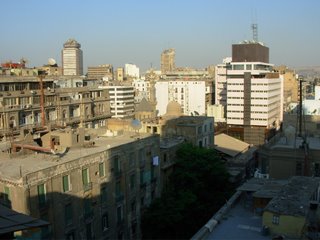
I took this picture from the rooftop "Solarium" at the Lotus Hotel while I was still staying in Wust-al-Balad. From this ninth storey, you can see lots of rooftop homes from above, including those here to the middle-left and bottom right. I like this picture because it shows the sharp light and cloudless sky that I'm getting to know here in Egypt. Towards the top right, you can see the Muqqatam Hills which mark the eastern edge of Cairo.
Yalla Fil Sina!!
Or, Let's go to Sinai!!
I was going to write something about the most recent tentatively encouraging news coming out of the Northern Ireland peace process, but then I remembered that this is "a blog written mainly for the benefit of family and friends." So, why not post some photos of my recent trip to the Sinai instead?

Friend S1 at sunrise after a long, well-spent night of cussing and discussing. In the far distance across the water you can see mountains at the western coast of Saudi Arabia.
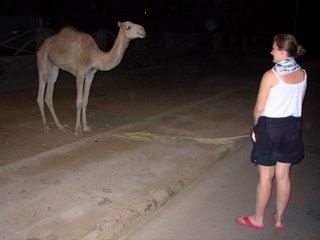
Friend S2 is shown with a Tarabin camel curiously extending a palm frond.
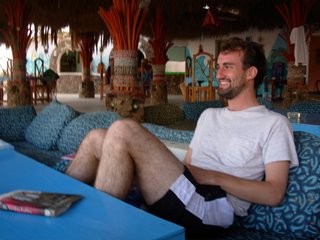
Friend S3 is sitting in the main tent at our camp during Casual Friday.
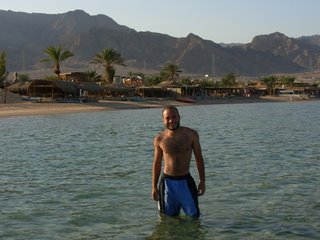
Friend S4 is standing in the Gulf of Aqaba with Sinai mountains and Tarabin behind him.
Last weekend, myself and four friends (who will, for the time being, remain nameless as I find it strange asking them if they'd like to star by name in my blog) went from Cairo on a large comfortable bus to the eastern edge of the Sinai peninsula, about seven hours over the desert, under the Suez canal, past numerous checkpoints and rest stops. This part of Egypt is culturally somewhat distinct from mainland Masr, and is a tourism hotspot along the Red Sea inlets. We went to a small town called Tarabin, on the Gulf of Aqaba, about 40 kilometers from the southern tip of Israel. We stayed at a place called Soft Beach Camp in small huts. At 10 EGP per night, and 50 meters from the Red Sea, this was a steal. This is perhaps one of the only experiences I've had that might turn me into a hedonistic, martini-swilling, lobster-skinned novelist. In the past, I had supposed that a few decades of smoking and seeing urban decay were the prerequisites for such a lifestyle, but now I wonder if instead you can skip that and commit yourself to lazing around on a beach thinking of character names.
I was going to write something about the most recent tentatively encouraging news coming out of the Northern Ireland peace process, but then I remembered that this is "a blog written mainly for the benefit of family and friends." So, why not post some photos of my recent trip to the Sinai instead?

Friend S1 at sunrise after a long, well-spent night of cussing and discussing. In the far distance across the water you can see mountains at the western coast of Saudi Arabia.

Friend S2 is shown with a Tarabin camel curiously extending a palm frond.

Friend S3 is sitting in the main tent at our camp during Casual Friday.

Friend S4 is standing in the Gulf of Aqaba with Sinai mountains and Tarabin behind him.
Last weekend, myself and four friends (who will, for the time being, remain nameless as I find it strange asking them if they'd like to star by name in my blog) went from Cairo on a large comfortable bus to the eastern edge of the Sinai peninsula, about seven hours over the desert, under the Suez canal, past numerous checkpoints and rest stops. This part of Egypt is culturally somewhat distinct from mainland Masr, and is a tourism hotspot along the Red Sea inlets. We went to a small town called Tarabin, on the Gulf of Aqaba, about 40 kilometers from the southern tip of Israel. We stayed at a place called Soft Beach Camp in small huts. At 10 EGP per night, and 50 meters from the Red Sea, this was a steal. This is perhaps one of the only experiences I've had that might turn me into a hedonistic, martini-swilling, lobster-skinned novelist. In the past, I had supposed that a few decades of smoking and seeing urban decay were the prerequisites for such a lifestyle, but now I wonder if instead you can skip that and commit yourself to lazing around on a beach thinking of character names.
9.27.2006
Idi Amin on the Big Screen
Today is the release date of the new film The Last King of Scotland. It is a story about Idi Amin's dictatorship in Uganda and his personal relationship with a (fictionalized) White physician. It occurs to me that we have seen a lot of Western-made thrillers in the last few years with African crises of one sort or another functioning as a supporting character, while white Westerners enjoy the lead roles and get the screen time. This new self-proclaimed thriller comes on the heels of The Interpreter, The Constant Gardener, and Lord of War. It will be interesting to see what the balance is in The Last King of Scotland between a story about Amin and Uganda and a crowd-pleasing thriller. Hopefully both aspects are interesting.
I thought I'd point out a very interesting 1974 documentary on Idi Amin, General Idi Amin Dada: A Self-Portrait. The title ironically refers to Amin's charm, naivete, and charisma; his assumption that he is in command of all social situations, including the making of the film. Based on the kind of unguarded moments that most filmmakers could only dream of, the German director Barbet Schroeder allows Amin plenty of rope to hang himself. He even went so far as to score the film with accordion music made by Amin.
I thought I'd point out a very interesting 1974 documentary on Idi Amin, General Idi Amin Dada: A Self-Portrait. The title ironically refers to Amin's charm, naivete, and charisma; his assumption that he is in command of all social situations, including the making of the film. Based on the kind of unguarded moments that most filmmakers could only dream of, the German director Barbet Schroeder allows Amin plenty of rope to hang himself. He even went so far as to score the film with accordion music made by Amin.
9.22.2006
The Global Day for Darfur
September 17 was the Global Day for Darfur coordinated by major human rights organizations across the world to pressure the government of Sudan to accept UN troops within their borders. Cairo was one of several cities that hosted the Day for Darfur, which took place at the American University in Cairo, hosted by Student Action for Refugees (STAR). Sudanese music, dance, food, crafts, and a film festival on the Darfur issue marked the occasion. The Cairo Institute for Human Rights Research summarizes their reasons for participating in the Day for Darfur here (English version).
It was wonderful to see the mingling of Sudanese and other residents and students who came together to celebrate these shared concerns. I thought of taking pictures but recognize that this is a politically sensitive issue in Egypt and that many people may not have been comfortable with their photo being taken. The internet is full of commentary on Darfur, but I'll just write a little blurb here on the major issues as I understand them.
Currently, various rebel groups based in Darfur fight with the Janjaweed militia, who are paid by the government to destroy villages and assisted in their operations by the government's air force and police. Some rebel groups in Darfur have signed a peace agreement with the Sudanese government but this has intensified the fighting of other rebel groups with the government. The African Union recently extended the mandate of its 7,000 peacekeeping troops until the end of 2006. But this is not an adequately provisioned or mandated force to effectively deter fighting in a region the size of France.
Though the atrocities in Darfur have been reported by human rights NGOs and many media outlets for years, the adequate political will necessary for finding a workable end to violence and dispossession of land has not been found. The violence stems from political and economic marginalization of the Fur and other ethnic groups in western Sudan, a separate decades-long civil war between the government and rebels in the south, and the government's expanding interest in land for oil exploration. Hundreds of thousands of people have died in the conflict, with millions internally displaced and others becoming refugees in Chad and other neighboring states. Rape, property destruction, poisoning of wells, and theft of livestock are widely established allegations as to the government's tactics in addition to murder. As many refugee camps are unreachable by humanitarian groups after the recent increase in fighting, malnutrition and starvation have become more likely among camp residents. See what Doctors Without Borders has to say about their decreasing access to Darfur camps here.
The recently-passed UN Resolution 1706 would add peacekeepers to the UN's current humanitarian role in Darfur. Unfortunately, this resolution hinges on the consent of the Sudanese government, which has not been granted.
It was wonderful to see the mingling of Sudanese and other residents and students who came together to celebrate these shared concerns. I thought of taking pictures but recognize that this is a politically sensitive issue in Egypt and that many people may not have been comfortable with their photo being taken. The internet is full of commentary on Darfur, but I'll just write a little blurb here on the major issues as I understand them.
Currently, various rebel groups based in Darfur fight with the Janjaweed militia, who are paid by the government to destroy villages and assisted in their operations by the government's air force and police. Some rebel groups in Darfur have signed a peace agreement with the Sudanese government but this has intensified the fighting of other rebel groups with the government. The African Union recently extended the mandate of its 7,000 peacekeeping troops until the end of 2006. But this is not an adequately provisioned or mandated force to effectively deter fighting in a region the size of France.
Though the atrocities in Darfur have been reported by human rights NGOs and many media outlets for years, the adequate political will necessary for finding a workable end to violence and dispossession of land has not been found. The violence stems from political and economic marginalization of the Fur and other ethnic groups in western Sudan, a separate decades-long civil war between the government and rebels in the south, and the government's expanding interest in land for oil exploration. Hundreds of thousands of people have died in the conflict, with millions internally displaced and others becoming refugees in Chad and other neighboring states. Rape, property destruction, poisoning of wells, and theft of livestock are widely established allegations as to the government's tactics in addition to murder. As many refugee camps are unreachable by humanitarian groups after the recent increase in fighting, malnutrition and starvation have become more likely among camp residents. See what Doctors Without Borders has to say about their decreasing access to Darfur camps here.
The recently-passed UN Resolution 1706 would add peacekeepers to the UN's current humanitarian role in Darfur. Unfortunately, this resolution hinges on the consent of the Sudanese government, which has not been granted.
9.12.2006
Two Weeks at The Lotus Hotel

The dominant color schemes of the Cairo Airport's Terminal 2 are alternating shades of grey and smudge. Though adequate in design, it is apparently a far cry from its glamorous, well-lit older sister, Terminal 1. The day I arrived in Cairo, customs was apparently a voluntary process for foreigners and I quickly emerged from the baggage claim area with all my bags intact to find Ahmed, a Lotus Hotel driver, in a small sea of drivers and Egyptian families and friends. He was holding a sign with my name on it. How wonderful to know that this was written in English and all had gone according to plan. Lufthansa, the Cairo Airport, and Ahmed were a wonderful combination.
The cab ride to the hotel was very exciting since, as a foreigner, I was not accustomed to the radical driving and pedestrianship which make Cairo streets so festive. Once at 12 Talaat Harb, I paid Ahmed and proceeded to take the ascinsir to the reception desk on the seventh floor. And thus began my strange romance with the Lotus Hotel.
The visual culture of the place spoke volumes about the hotel's history in an arcane dialect. 1956 was the year of the revolution and the hotel was founded well before then. Yet much of the Hotel - from its strange and unkempt "Solarium" on the rooftop, to the Polo Bar and Lounge with its satellited classic Arab films and gaudy comedies, to the worn wallpaper and tile of the rooms, the whole package seemed to achieve a 1970s aesthetic that was looking back to the 1940s. It was like going to the living room of grandparents, or an old Elks Lodge, or into a Ben Katchor comic strip.
And it was comfortable. Near the university and sort of in the center of Wust-Al-Balad, the downtown area, this is a good section of the city to get one's bearings in. And once the AC is on this time of year, the Lotus Hotel is a good place to sleep and recover from those first exhausting excursions. Its also a good place to get something to eat and to chill with staff when they are on break. Both of these became real pleasures for me.
I would look into apartment listings, poke around in the Wust-Al-Balad and Garden City areas, and then return to the Lotus to chat with staff in my very limited Arabic and some English, and to eat dinner. This usually involved soup, a delicious buttery plate of rice, a salad of tomatoes and cucumbers and then the main entree, usually chicken and french fries. I tended to top this off with a large bottle of water. From my conversations with Ibrahim and Samiira the cleaners, Ayman and Achmed the bellhops, and the two Muhammads in the dining room, I had some wonderful exchanges and got some good help with Arabic. I learned that tourism in Egypt is in decline and that during this recession, money is scarce. Many people had taken multiple shifts or were working six days a week to make up for a decline in tips, which is really where the money is if you work in a hotel here, or anywhere, I would guess.
When I finally left for my apartment, I was beset upon by some of the staff asking for additional baksheesh (tips). This left a strange feeling in my stomach; a combination of a sense that I'd been duped, and maybe that I just hadn't been tipping enough throughout my time there. Even my taxi driver caught the whiff of a wayward Amrikki and demanded far more than I would have expected, just because I was leaving a hotel. But I was just leaving the Lotus Hotel, I had thought to myself, as if it was my house or something. Ah, well. I still plan to go back and visit.
9.01.2006
The Death of Naguib Mahfouz

The Egyptian writer, intellectual, and civil servant Naguib Mahfouz died of old age on August 30. A very prominent and sometimes controversial figure in modern Egyptian literature and society, Mahfouz became the first Arab recipient of the Nobel Prize for Literature in 1988.
His famous book The Cairo Trilogy was only published in English in 1991, over 30 years after it first appeared in Arabic. This is one of maybe five books I brought with me to Cairo and I regret to say I haven't finished it yet.
Al-Ahram's coverage of his passing is here. You can find the Guardian obituary here.
I took this picture of a statue of Mahfouz in Midan Sphinx (Sphinx Square).
A Note on the Links
My reasons for posting the links on the right are probably clear enough based on the rest of my blog and my little prologue. Most links go to English language sites, and for the news sites, some link to coverage of the Middle East and Africa instead of a home page. Hopefully, these links will pique your curiosity and provide for some interesting reading on human rights, current affairs, or perhaps just what's happening for me here in general. At the risk of sounding a bit defensive, I don't necessarily condone every viewpoint you'll find in these.
I'll likely change some of the links over time to make them more coherent or relevant, and suggestions are welcome.
I'll likely change some of the links over time to make them more coherent or relevant, and suggestions are welcome.
Prologue: Cutting the Blog Ribbon
I've had two weeks of firsts here, since arriving in Al-Qahirah on August 19.
I took my first Cairo taxi, stayed in my first Cairo hotel, saw the Nile for the first time, ate many local foods for the first time, made my first visit to campus and met professors, heard my first muezzin call out from a mosque, made my first apartment search, purchased my first ever cell phone, took my first trip on the metro system, fought valiantly against diarrhea for the first time in a long time, saw my first Cairene bachelor party, met my new roommate for the first time, was "invited" into a perfume shop for the first time and learned quickly how to refuse a sale, took my first Arabic lessons, and exchanged my first Arabic words with native speakers.
And I'm starting this blog, another first. You can imagine how long I took struggling to find a good title. The Cairo Connection seemed too espionage-oriented. The Nile Monitor seemed too tongue-in-cheek. And to my dismay, From Cairo, With Love was already taken. So, since I'm interested in the everyday details of life here, I thought Cairene Routines would be a fitting rhyme. As you probably know, I tend to be skeptical of Westerners -- particularly grizzled expatriates or wild-eyed backpackers -- who revel in being informed guides to an Exotic or developing society. Respect for local people and culture is one thing, but I can't somehow become a "native" tourist e-guide for foreigners and don't think this is even a worthwhile goal. So my intent here is basically to keep you posted on what I'm up to, what I'm learning and thinking about, and who I'm spending my time with. I also want to use a form that you can refer to at your own pace and that won't stress your email account with too great a demand for memory.
I plan to post when I feel I have something good to share, maybe every week or two. I want to give snapshots, reflections, anecdotes, and fragments of things, because I think these may be more interesting than political diatribes, or on the other extreme, too-precious personal feelings. If you want to leave comments, anyone is now able to do so (following my approval of the comment).
Its good to be starting this little project and I hope you enjoy it. But we can't let it substitute for email or letters or phone calls or skyping . . .
An Epilogue for the Prologue:
If you ever want to start your own blog, you can do so for free at blogger.com. Even though it seems like these are sprouting like weeds, as my Dad is wont to say, "There's always room for a good one." In case you are interested, Reporters Without Borders offers an interesting handbook for bloggers in particularly difficult places.
I took my first Cairo taxi, stayed in my first Cairo hotel, saw the Nile for the first time, ate many local foods for the first time, made my first visit to campus and met professors, heard my first muezzin call out from a mosque, made my first apartment search, purchased my first ever cell phone, took my first trip on the metro system, fought valiantly against diarrhea for the first time in a long time, saw my first Cairene bachelor party, met my new roommate for the first time, was "invited" into a perfume shop for the first time and learned quickly how to refuse a sale, took my first Arabic lessons, and exchanged my first Arabic words with native speakers.
And I'm starting this blog, another first. You can imagine how long I took struggling to find a good title. The Cairo Connection seemed too espionage-oriented. The Nile Monitor seemed too tongue-in-cheek. And to my dismay, From Cairo, With Love was already taken. So, since I'm interested in the everyday details of life here, I thought Cairene Routines would be a fitting rhyme. As you probably know, I tend to be skeptical of Westerners -- particularly grizzled expatriates or wild-eyed backpackers -- who revel in being informed guides to an Exotic or developing society. Respect for local people and culture is one thing, but I can't somehow become a "native" tourist e-guide for foreigners and don't think this is even a worthwhile goal. So my intent here is basically to keep you posted on what I'm up to, what I'm learning and thinking about, and who I'm spending my time with. I also want to use a form that you can refer to at your own pace and that won't stress your email account with too great a demand for memory.
I plan to post when I feel I have something good to share, maybe every week or two. I want to give snapshots, reflections, anecdotes, and fragments of things, because I think these may be more interesting than political diatribes, or on the other extreme, too-precious personal feelings. If you want to leave comments, anyone is now able to do so (following my approval of the comment).
Its good to be starting this little project and I hope you enjoy it. But we can't let it substitute for email or letters or phone calls or skyping . . .
An Epilogue for the Prologue:
If you ever want to start your own blog, you can do so for free at blogger.com. Even though it seems like these are sprouting like weeds, as my Dad is wont to say, "There's always room for a good one." In case you are interested, Reporters Without Borders offers an interesting handbook for bloggers in particularly difficult places.
Subscribe to:
Posts (Atom)




